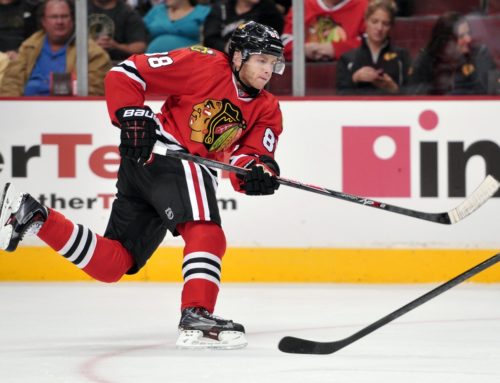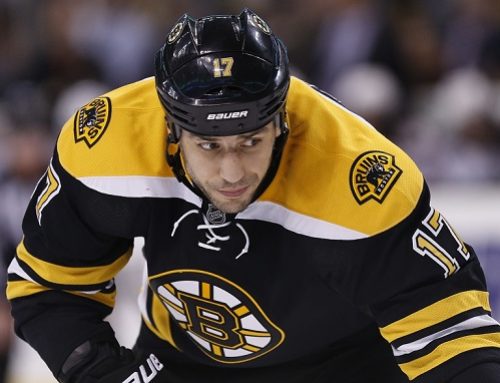
The second round of the 2010 Stanley Cup Playoffs has been a great display of the dynamic surrounding games played and workload. Why does it seem like the workhorses are wearing down, while those that didn't play as many games during the season are performing better? Although there's no direct correlation or clear-cut answer to the question, what we are seeing right now is no random coincidence.
Not only are the numbers a pretty clear indication of energy drain, they allow a goalie scout to get a much better understanding of a goalie's long-term potential. By looking at these numbers as a whole, then applying it to the goalie's activity, movements and demeanor in the crease, even the casual fantasy manager will benefit from understanding these dynamics. So pull up the patented Playoff Beast Tracker and follow along with me!
Antti Niemi only played in 39 games during the regular season. Tuukka Rask and Jaroslav Halak both only played in 45 games. Brian Boucher trumped them all by only playing in 33 games. Coincidentally, all of the goalies listed above, as of Monday, were still fighting for their right to lift the Stanley Cup.
Martin Brodeur played in 77 regular season games this year. Jon Quick played in 72. Craig Anderson played in 71 games. Ryan Miller played in 69 games and Ilya Bryzgalov played in 68. All of those goaltenders exited stage left after the first round of the Stanley Cup playoffs. Regardless of the reasons why you feel they ultimately lost the series, these goalies simply failed to win more games than their opponent.
If you have ever read a School of Block article in the last three years, you know that I rarely depend on a statistic or a number to prove anything. But when you look at the number of goalies alive in the playoffs that logged less than 60 games during the regular season, and the volume of goalies that suffered from serious energy drain in the first round, you are left with a clear and present fact – there's no advantage to playing so many games during the regular season.
I hate to bring it up again, but the decisions that head coaches and organizations make regarding the workload of their starting goaltender are extremely residual. By that I simply mean that it adds up. It doesn't matter how good or how experienced a goalie happens to be – they are all human and they are all prone to energy drain. There is no reason Anderson and Quick had to play 70+ games when Peter Budaj and Erik Ersberg are solid backups with the ability to win games.
But I refuse to digress on this topic, as you have heard as much as I have said it, that teams not only need two capable goalies to be successful, they need to ACTUALLY USE THEM in appropriate situations. Too many times, teams simply default to the starting goalie because that is what he is paid to do. Rust builds up on the backup, and then when bad things happen, teams are stuck riding the horse that got them to the playoffs.
Returning to the topic at hand, I'm left to dissect two goaltenders that are considered elite, veteran workhorses. Roberto Luongo and Evgeni Nabokov played in 68 and 71 games respectively in the regular season, are considered the defensive leaders of their club and are still battling in the playoffs.
Nabokov has been a silent star through two rounds. It is not easy to see limited shots in a round that has the same feeling as last year's upset to the Ducks. Anderson was standing on his head, making almost double the amount of saves Nabokov was making. Yet when the heat was cranked up, Nabokov was there with many focused, timely saves that reinforced the fact he's an elite goalie.
By looking at the Beast Tracker, you can see Nabokov's timely play reflected through the numbers. Besides his weak performance in Game 4 against Detroit, Nabokov has been the rock that San Jose needs to shake off their twisted and dark playoff history. His save percentage drastically improves as games go along. He has only allowed three goals while up a goal and only three while down a goal. His save percentage while short-handed is quite revealing, as even though he is a product of quality penalty killing, he has still allowed only three goals on 44 shots.
What makes Nabokov such an amazing goalie to follow is simply how consistent he is, regardless of the minutes he logs. Of course it would be unfair to say these things without pointing out he doesn't face as many shots as some of the other workhorses, but compared to Luongo, he faced more shots and logged more minutes during the regular season. In fact, it averaged out to be just over two extra shots per game for Nabokov.
So what about Nabokov's game makes him so consistent, even though he's played more games than any other active goalie in the playoffs? It is two things – his efficient style and his mental toughness. Everything about Nabokov screams efficiency, from his narrowed, upright stance to his rebound control to his stone-cold demeanor. He absorbs a lot of shots by playing very high in his crease, he rarely gets caught scrambling or diving around in the crease and he's about as animated as a cardboard box.
Over the course of a season, this allows Nabokov to conserve so much energy that when the playoffs roll around, it's like he's only played 50 games. Less movement, less rebounds and less aggravated or frustrated reactions equals more energy late in games. Add it up over the course of 70-80 games and you have a bushel of energy to add back into the tank for the post-season run. It hasn't led to a Stanley Cup for Nabokov…yet. But it is a clearly definable aspect of his game and the most obvious reason for his success.
Although Luongo has had plenty of timely saves and performances as well in his playoff run, he has continued to struggle with consistency and fighting through traffic. Compared to Nabokov, he has shown a considerable amount of energy drain. His save percentage is well below average (.899) and it comes as no surprise that his highest save percentage by period comes in the first frame (.920, .874, .905).
Luongo's biggest struggle in the playoffs, however, has come while short-handed. He has an abysmal .773 save percentage on the penalty kill, allowing 17 goals on just 75 shots. But again, stats are meaningless until you reflect back on his actual play in the crease. That is where the proof of energy drain is truly found.
A goalie that is suffering from energy drain, like Luongo, will have a somewhat lazy appearance and demeanor in the net. Their recovery will be anywhere from labored to slightly slower than usual. They will lack a sense of urgency and struggle to pounce on loose pucks around the net. On shots just wide of the net, a tired goalie will turn their head with a slight delay. They will not verbally communicate as loudly, or as often, with their defensemen. They won't slam sticks at the end of power plays. They won't move much in between plays. They will whack opposing players without a purpose, or when the purpose can be exaggerated without taking a penalty. They will hunch over and place most of their upper body weight on their stick to rest. They don't appear as upright in the butterfly as usual, either sitting back on their heels or falling over on their stomach. They will lack precise balance and maybe even stumble once or twice.
But most importantly, a tired goalie will give up bad rebounds, struggle to make good decisions handling the puck, fail to look around bodies to keep their eyes on the puck and allow screens in front to push them deeper in their crease. Luongo has displayed all of these traits more than once at some point or another in the second round.
As a result, all of these signs of energy drain act as major influential factors in the overall ability for a goalie to win in the playoffs. Why? Because they are all rooted in one thing – mental toughness. There has to be a certain amount of high-level brain activity taking place that allows the goalie to execute without failing or lacking in any of the areas listed above. It's easy to accomplish in Game 1 – not so easy in Game 91.
And in this goalie scout's opinion, that is what truly separates the winners from the losers. Mental lapses are totally tied to a lack of energy and strength. When the body weakens, the mind weakens. And if that leads to one goal against, it could be the difference between advancing in the playoffs and disappointing failure.





 FLA
FLA EDM
EDM MIN
MIN BUF
BUF NYR
NYR CHI
CHI OTT
OTT L.A
L.A UTA
UTA MTL
MTL CGY
CGY
